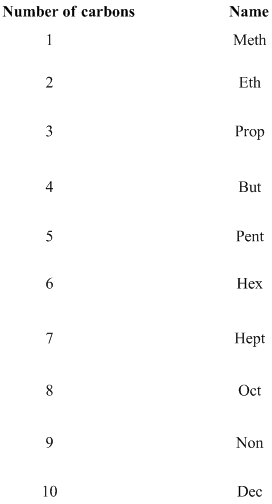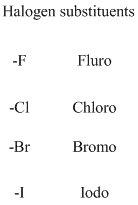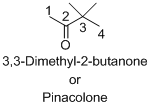
Concept explainers
(a)
Interpretation:
The structure of the organic compounds should be given.
Concept introduction:
Organic compounds are named systematically by using IUPAC rules.
Name of the organic compounds are given according to the number of carbon present in the molecule for example
A molecule having one carbon atom, the molecule name will start with meth etc.…

If any halogens are present in the molecule, the name of the halogens as follows.

Naming the substituted
- (1) Name the parent alkane (long alkyl chain)
- (2) Number the carbon
- (3) Name and number the substituent
If the molecules have the multiple substituents, the compound named as di, tri, tetra, penta, ect.

If the molecules having
The given compound is an alcohol
Example is given below


The given compound is an acid (

The amides are derivatives of acids and it is named as the ending of alkane with amide.
For example

If the molecule is ester,
Esters end with “ate”
Example

The given compound is an

The given compound is an aldehyde (

The given compound is an aldehyde (

(a)
Answer to Problem 23.14QP
Answer
- (1) Structure of the given organic compounds is shown below (a).

Explanation of Solution
To find: The structure of the given organic molecule.
Name of the given organic compounds is 3,3-dimethyl-2-butanone.

Parent chain is identified and numbering is given for the compound. According to the name, third carbon is bearing two methyl groups and second carbon is bearing one carbonyl group and the given name is butane which clearly indicates that the compound having four carbon atoms in the parent molecule and two carbon atoms in the side chain. According to the name, the structure of the molecule is given above.
(b)
Interpretation:
The structure of the organic compounds should be given.
Concept introduction:
Organic compounds are named systematically by using IUPAC rules.
Name of the organic compounds are given according to the number of carbon present in the molecule for example
A molecule having one carbon atom, the molecule name will start with meth etc.…

If any halogens are present in the molecule, the name of the halogens as follows.

Naming the substituted alkane:
- (4) Name the parent alkane (long alkyl chain)
- (5) Number the carbon
- (6) Name and number the substituent
If the molecules have the multiple substituents, the compound named as di, tri, tetra, penta, ect.

If the molecules having functional group, the name of the compound is given below. Numbering should be starts from the functional group of the given molecule.
The given compound is an alcohol
Example is given below


The given compound is an acid (

The amides are derivatives of acids and it is named as the ending of alkane with amide.
For example

If the molecule is ester,
Esters end with “ate”
Example

The given compound is an aldehyde (

The given compound is an aldehyde (

The given compound is an aldehyde (

(b)
Answer to Problem 23.14QP
Answer
Structure of the given organic compounds is shown below (b).

Explanation of Solution
To find: The structure of the given organic molecule.
Name of the given organic compounds is 3-hydroxybutanal

Parent chain is identified and numbering is given for the compound. According to the name, third carbon is bearing one hydroxyl group and first carbon is bearing one aldehyde group and the parent name of the molecule is butane which clearly indicates that the compound having four carbon atoms in the parent. According to the name, the structure of the molecule is given above.
(C)
Interpretation:
The structure of the organic compounds should be given.
Concept introduction:
Organic compounds are named systematically by using IUPAC rules.
Name of the organic compounds are given according to the number of carbon present in the molecule for example
A molecule having one carbon atom, the molecule name will start with meth etc.…

If any halogens are present in the molecule, the name of the halogens as follows.

Naming the substituted alkane:
- (7) Name the parent alkane (long alkyl chain)
- (8) Number the carbon
- (9) Name and number the substituent
If the molecules have the multiple substituents, the compound named as di, tri, tetra, penta, ect.

If the molecules having functional group, the name of the compound is given below. Numbering should be starts from the functional group of the given molecule.
The given compound is an alcohol
Example is given below


The given compound is an acid (

The amides are derivatives of acids and it is named as the ending of alkane with amide.
For example

If the molecule is ester,
Esters end with “ate”
Example

The given compound is an aldehyde (

The given compound is an aldehyde (

The given compound is an aldehyde (

(C)
Answer to Problem 23.14QP
Answer
Structure of the given organic compounds is shown below (c).

Explanation of Solution
To find: The structure of the given organic molecule.
Name of the given organic compounds is ethyl pentanoate.

Parent chain is identified and numbering is given for the compound. According to the name, fifth carbon is bearing ester group (
(d)
Interpretation:
The structure of the organic compounds should be given.
Concept introduction:
Organic compounds are named systematically by using IUPAC rules.
Name of the organic compounds are given according to the number of carbon present in the molecule for example
A molecule having one carbon atom, the molecule name will start with meth etc.…

If any halogens are present in the molecule, the name of the halogens as follows.

Naming the substituted alkane:
- (10) Name the parent alkane (long alkyl chain)
- (11) Number the carbon
- (12) Name and number the substituent
If the molecules have the multiple substituents, the compound named as di, tri, tetra, penta, ect.

If the molecules having functional group, the name of the compound is given below. Numbering should be starts from the functional group of the given molecule.
The given compound is an alcohol
Example is given below


The given compound is an acid (

The amides are derivatives of acids and it is named as the ending of alkane with amide.
For example

If the molecule is ester,
Esters end with “ate”
Example

The given compound is an aldehyde (

The given compound is an aldehyde (

The given compound is an aldehyde (

(d)
Answer to Problem 23.14QP
Structure of the given organic compounds is shown below (d).

Explanation of Solution
To find: The structure of the given organic molecule.
Name of the given organic compounds is 2,2,2-trichloroethanal.

Parent chain is identified and numbering is given for the compound. According to the name, second carbon is bearing an amine group, sixth carbon is bearing one methyl group and the parent name of the molecule is heptane which clearly indicates that the compound having seven carbon atoms in the parent. According to the name, the structure of the molecule is given above.
Want to see more full solutions like this?
Chapter 23 Solutions
CHEMISTRY:ATOMS FIRST (LL)>CUSTOM PKG.<
- 4. Read paragraph 4.15 from your textbook, use your calculated lattice energy values for CuO, CuCO3 and Cu(OH)2 an explain thermal decomposition reaction of malachite: Cu2CO3(OH)2 →2CuO + H2O + CO2 (3 points)arrow_forwardPlease sirrr soollveee these parts pleaseeee and thank youuuuuarrow_forwardIII O Organic Chemistry Using wedges and dashes in skeletal structures Draw a skeletal ("line") structure for each of the molecules below. Be sure your structures show the important difference between the molecules. key O O O O O CHON Cl jiii iiiiiiii You can drag the slider to rotate the molecules. Explanation Check Click and drag to start drawing a structure. Q Search X G ©2025 McGraw Hill LLC. All Rights Reserved. Terms of Use F 3 W C 3/5arrow_forward
- 3. Use Kapustinskii's equation and data from Table 4.10 in your textbook to calculate lattice energies of Cu(OH)2 and CuCO3 (4 points)arrow_forward2. Copper (II) oxide crystalizes in monoclinic unit cell (included below; blue spheres 2+ represent Cu²+, red - O²-). Use Kapustinski's equation (4.5) to calculate lattice energy for CuO. You will need some data from Resource section of your textbook (p.901). (4 points) CuOarrow_forwardWhat is the IUPAC name of the following compound? OH (2S, 4R)-4-chloropentan-2-ol O (2R, 4R)-4-chloropentan-2-ol O (2R, 4S)-4-chloropentan-2-ol O(2S, 4S)-4-chloropentan-2-olarrow_forward
- Use the reaction coordinate diagram to answer the below questions. Type your answers into the answer box for each question. (Watch your spelling) Energy A B C D Reaction coordinate E A) Is the reaction step going from D to F endothermic or exothermic? A F G B) Does point D represent a reactant, product, intermediate or transition state? A/ C) Which step (step 1 or step 2) is the rate determining step? Aarrow_forward1. Using radii from Resource section 1 (p.901) and Born-Lande equation, calculate the lattice energy for PbS, which crystallizes in the NaCl structure. Then, use the Born-Haber cycle to obtain the value of lattice energy for PbS. You will need the following data following data: AH Pb(g) = 196 kJ/mol; AHƒ PbS = −98 kJ/mol; electron affinities for S(g)→S¯(g) is -201 kJ/mol; S¯(g) (g) is 640kJ/mol. Ionization energies for Pb are listed in Resource section 2, p.903. Remember that enthalpies of formation are calculated beginning with the elements in their standard states (S8 for sulfur). The formation of S2, AHF: S2 (g) = 535 kJ/mol. Compare the two values, and explain the difference. (8 points)arrow_forwardIn the answer box, type the number of maximum stereoisomers possible for the following compound. A H H COH OH = H C Br H.C OH CHarrow_forward
 Introductory Chemistry: An Active Learning Approa...ChemistryISBN:9781305079250Author:Mark S. Cracolice, Ed PetersPublisher:Cengage Learning
Introductory Chemistry: An Active Learning Approa...ChemistryISBN:9781305079250Author:Mark S. Cracolice, Ed PetersPublisher:Cengage Learning Chemistry: The Molecular ScienceChemistryISBN:9781285199047Author:John W. Moore, Conrad L. StanitskiPublisher:Cengage Learning
Chemistry: The Molecular ScienceChemistryISBN:9781285199047Author:John W. Moore, Conrad L. StanitskiPublisher:Cengage Learning Organic And Biological ChemistryChemistryISBN:9781305081079Author:STOKER, H. Stephen (howard Stephen)Publisher:Cengage Learning,
Organic And Biological ChemistryChemistryISBN:9781305081079Author:STOKER, H. Stephen (howard Stephen)Publisher:Cengage Learning, General, Organic, and Biological ChemistryChemistryISBN:9781285853918Author:H. Stephen StokerPublisher:Cengage Learning
General, Organic, and Biological ChemistryChemistryISBN:9781285853918Author:H. Stephen StokerPublisher:Cengage Learning Chemistry: Principles and ReactionsChemistryISBN:9781305079373Author:William L. Masterton, Cecile N. HurleyPublisher:Cengage Learning
Chemistry: Principles and ReactionsChemistryISBN:9781305079373Author:William L. Masterton, Cecile N. HurleyPublisher:Cengage Learning




